SPOOK AND DIESEL
The Flamingo Cull at the Troyeville Hotel
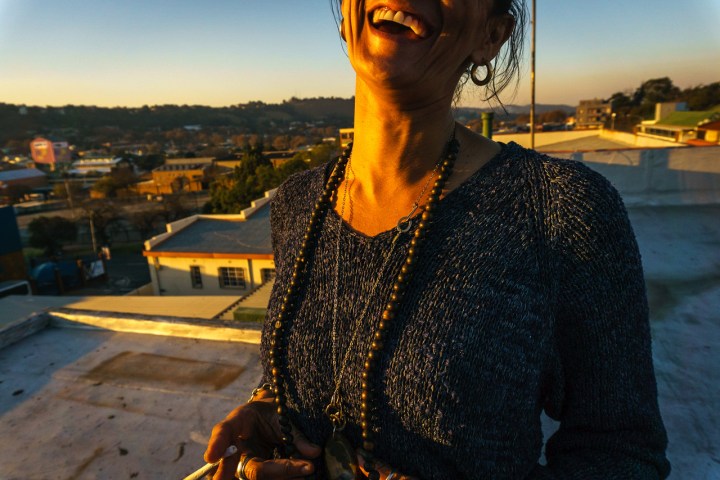
Returning to Johannesburg’s polished and pimped-up Troyeville Hotel after a few years AWOL, the writer discovers nostalgia is for the bitter.
The ghost hunters arrived soon after a most unusual calamity. The waiters, like discombobulated birds signalling an imminent earthquake, had scurried through the Saturday night bar crowd from the adjacent restaurant searching for refuge.
The staff’s panicked pace had ruffled the drinkers’ equilibrium to lend anticipation’s brief silence to an unknown threat.
Pouring industrial quantities of alcohol since 1939 to oil a cacophony revelling in a slew of African and colonial tongues in a windowless room – punctured by a flat screen array tracking multiple sporting fetishes – and clogged by cigarette and cigar smog, had failed to dull the patrons’ sixth sense for trouble.
The sliver of silence reflected the confusion. Joburg’s mayhem had seemingly been reserved for the other side of the Troyeville Hotel’s jail-cell street entrance. The alcohol-infused parlour had offered immunity from South Africa’s low-intensity war and the cocoon was about to be pierced.
A heavy vibration from a table upturned, dancing cutlery and crockery’s percussion, was swiftly followed by a glass door shattering and a behemoth wobbling into the bibulous lounge. The sea-change into a bar’s jaded audience’s singular gaze showing uniform contempt appeared to soothe his intoxicated fever.
His pint-size lover in a black, sequinned dress seized on the awkward interlude, morphing into a walking stick to chaperone him to the street – leaving an unpaid bill and the lingering conundrum for out-of-sort couples: How does the arithmetic work for the down-and-dirty communion?
“What was that about?” I asked Joel. “He drunk too much,” the waiter answered. “Everyone drinks too much at The Troyeville,” I replied. “I know,” Joel said. “Do you want another round?”
Ever-changing moods
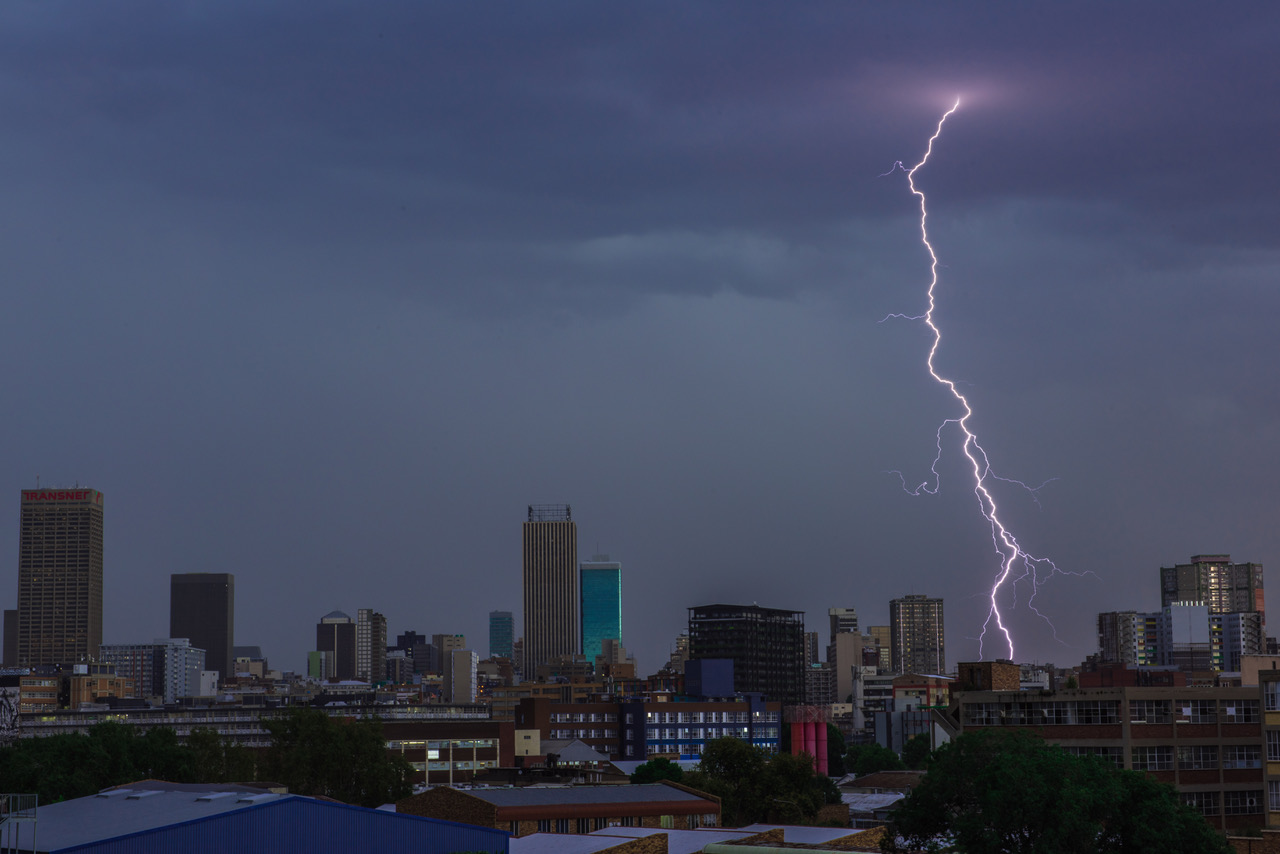
The Highveld storms from the hotel’s roof were akin to a King Lear soliloquy. ‘You sulph’rous and thought-executing fires.’ (Photo: Guy Oliver)
After 25 years as a regular, and more than two years as a hotel resident, it was the worst violence witnessed at the inn; short of a banker’s 43-year-old chain-smoking trust-fund daughter using her untouched lemon-and-herb grilled prawn platter as an ashtray.
Booze and bar fights are generally baked into the duet’s modus operandi. Of all society’s psychotropic substances to grant a legal monopoly as a salve, it chose a drug that is clinically aggression’s kissing cousin and the catalyst for nearly half of the world’s violent crime, according to the World Health Organisation.
Alcohol’s truce at The Troyeville rated it as an outlier from its dark moods and malice.
The two lauded female photographers – both with rich archives pock-marked by apartheid and democracy’s grim contact sheets – were interrupted in an autopsy of The Troyeville’s earlier fracas by the ghost tour’s Geiger Counter-like contraption zeroing at their bar table as the font for paranormal activity.
Local mythology dabbles in the hedonistic, nihilistic and all-male white 1950s Ducktail Gang as the hotel’s restless spirits, which may mirror some present patrons, but is a pale influence from the hotel’s essence distilled by topography.
The Troyeville suburb’s north-facing aspect was favoured by settlers from Portugal’s Madeira archipelago, about 500 km west from the Moroccan coastline, to stamp a different colonial spiel on an infant city’s eastern shoulder from Empire’s English.
The linguistic haunt

The rooftop was used for odd weddings, picnics, smoking weed, solar geysers and hanging washing before it was converted to a venue. (Photo: Guy Oliver)
The lingua franca’s footprint was enlarged by the continent’s events. Portuguese-speaking colonials fleeing 1975 Angola and Mozambique independence found Troyeville a soft landing – replicated these days by the “better-life” foreign migrant brigade and shopping-tourists from the same Lusophone countries.
Braced by the grapevine’s warning, the R10-million makeover by new owners during the plague had sullied the hotel’s soul and failed to check rising resentment sauntering into the Flamingo restaurant.
The restaurant annex and its phenicopter fresco, whose eccentricity served as a backdrop for artist Karl Gietl’s handlebar-moustached alter ego Pablo and his gluttonous wine-fuelled luncheons, was reinvented as a coffee shop; the shocking-pink Flamingo mural desecrated by a subway train in the chalk and blackboard genre.
The bar’s renovation echoed Constantinople’s 13th-century sacking and its repopulation with one-armed bandits its stain. What once was, could never be again.
The bar had been a retreat from the valley and ridges’ frontlines. The barflies had their allotments and irritation visible and risible when trespassed. There was usually a gamble riding on a domestic or foreign sporting occasion, as well as low odd side-bets entertained for when Parliament’s White Shirts would evict Julius Malema’s EFF when presidents Jacob Zuma or Cyril Ramaphosa were in the House.
Misfits and murder
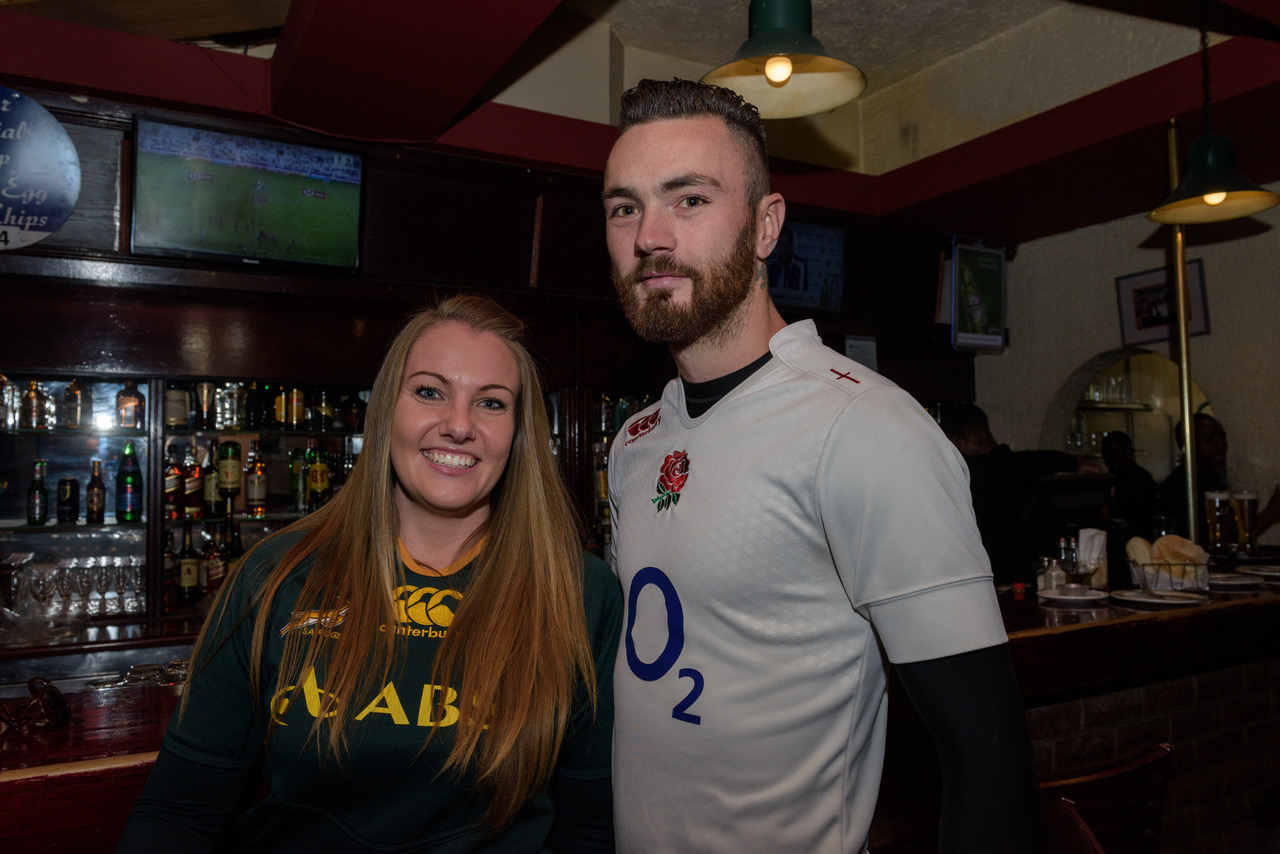
Fluffy-tailed sport fans at the old Troyeville bar before strolling to Ellis Park to watch England lose against the Springboks in a 2018 rugby Test match. (Photo: Guy Oliver)
The Troyeville’s farrago of regulars caught in the mesh threaded the quixotic with the disillusioned, the generous and the bitter, the cheated and the maligned, as well as the weary.
The multimillion-rand makeover had reformatted the bar’s memory. The bar table where a renowned South African artist slipped a postcard-sized sketch to a friend had been swallowed by a wall. A decade or so later the birthday gesture bankrolled a house in the Western Cape’s Pringle Bay.
Gallows humour had buffeted a novelist’s horror on returning from out of town to his Troyeville home to find the house-sitter, upright, naked, dead and trussed to a kitchen chair like a fowl. A red-ball gag suggested either a sex-game gone awry or an intended climax and a sufficient mind-fuck to lose a local in a hurried evacuation to the northern suburbs’ housing laagers.
The bar’s catchment area stretched beyond the Troyeville suburb. The cuisine was partially to blame, but it was as the community playground, replete with squabbles, boasts, envies and camaraderie, that imbued a drinking hole’s gravity.
Serving congregants from supercar mechanics to mosaicists, sculptors, business operators, metal workers, poets, carpenters, political and environmental hacks, revanchists, gunrunners, spooks, musicians and soured Struggle foot soldiers who blended like a family on the skids. An odd brew drawing intrigue from riches’ obscenities – albeit at arms’ length.
A northern suburbs-based private equity boss would blood his annual varsity graduate intake with a Bonfire of Vanities run for a “non-obligatory” Troyeville Hotel soirée as a test of mettle for venturing into the unknown.
The bar was transformed by white linen tablecloths and obsequious corporate disciples donning Woolworths’ smart casuals and cocktail dresses buzzing around a buffet centrepiece spilling seafood, salads and peri-peri chicken delights. The regulars shunted to the restaurant and were palmed off with two complimentary drinks by a financial predator’s dop system nostalgia.
The night fighters
The odd sex worker slipped into The Troyeville, but there was little to no demand for the distraction.
One long-term Troyeville Hotel resident’s night fighter penchant – sourced from the outside – suffered a virtual boycott among the local professionals. The sex workers’ nom de guerre for the squat monolingual 60-year-old Portuguese speaker – the Duracell Bunny – required no further elaboration.
The marathon hotel residents, some with 15 years or more tenure and at least one carried out in a body bag, did not make the grade for The Troyeville’s new daily tariff room rates. The lifers were all men. A collection of widowers, loners and those attuned to an urban wilderness.
Short-term residents, dossing for a few weeks or months, attracted neighbouring state traders, fresh fallout from psychotic relationships, visiting foreign artists and wandering families.
My first hotel resident stint was before the rooms were spruced up along with the monthly rates – from a bargain plus laundry to a fair deal – for a bed, basin, cupboard, communal toilet and a rattling window from day and night Albertina Sisulu road traffic. The residents’ evergreen complaint was the lack of a bannister on the three-storey hotel’s first flight of stairs that smelt like an unofficial sobriety test. It was routine encountering a resident swaying like a praying mantis while studying an unaided step challenge with the same thought-intensity as an Olympic long-jumper about to commence a 40-metre run.
Tasting oblivion
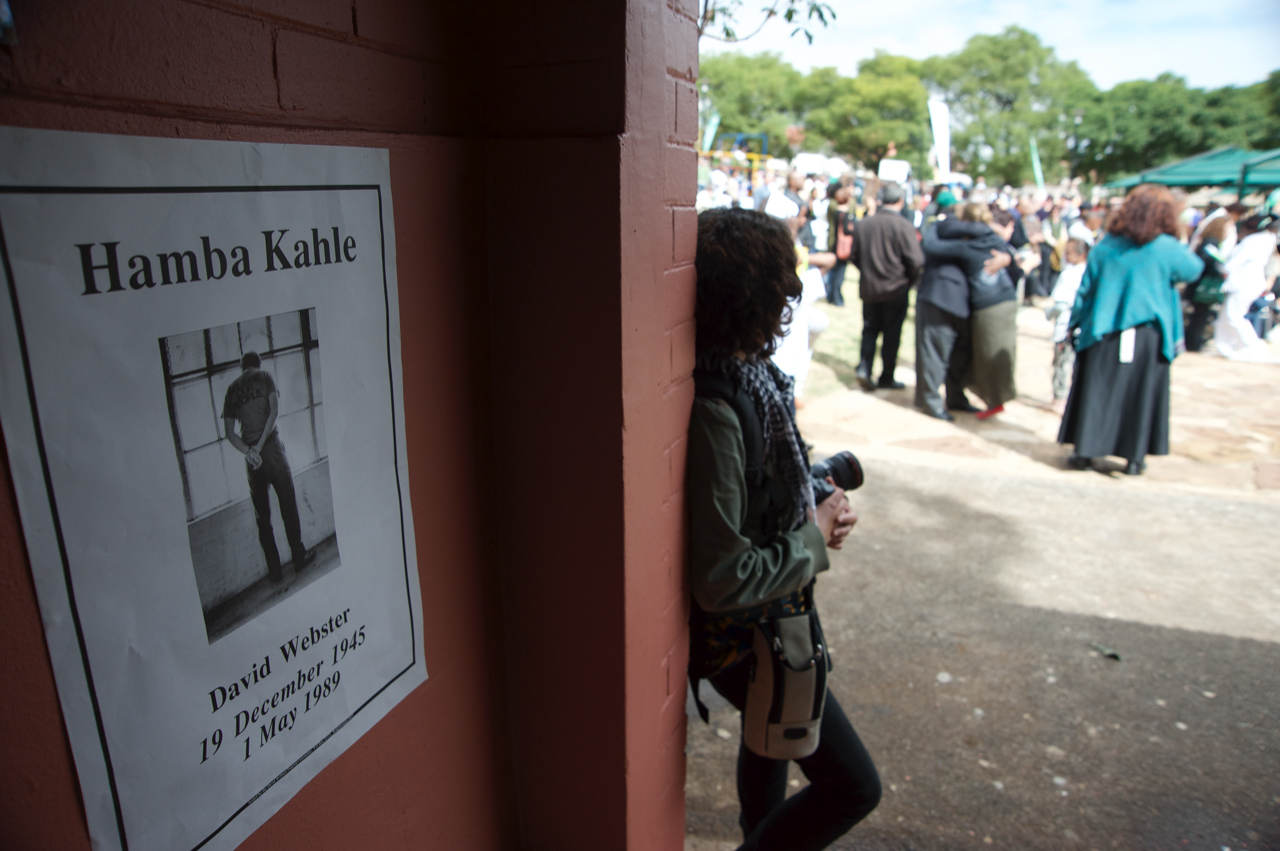
The Troyeville park’s 2009 renaming ceremony in honour of Troyeville resident and assassinated anti-apartheid activist David Webster. (Photo: Guy Oliver)
Oblivion’s tart taste had a different flavour at The Troyeville. The walking wounded carried by their brothers-in-arms in a shell-shocked cliché – often in an Ellis Park rugby international aftermath – allowed comedy to obscure an overdose’s despair. (At its most bleached were empty cheap alcohol cartons repurposed as sand-filled building blocks for temporary shelters by “Bushmen” road gangs cutting the Kalahari Highway, trailed by entrepreneurs swapping daily wages for another night’s boozing and boxing).
After the Mozambican owner sold the hotel to the Australian and two local partners, the Coke and red wine tipple katemba – the wine’s snob abomination – was on a forever special, despite the discount enticing few if any converts.
The whisperings among the bar’s faithful before that transition was a dread that the “Yuppie” troika would reimagine the bunker into a swish Sydney-style wine bar catering to bland wealth. But there was little tinkering with the hotel’s engine room, beyond hanging unnoticed artworks and fitting a long-overdue pool table.
The barflies’ premonition landed after the hotel’s latest sale to a syndicate where money’s logic has no nuance or respect for memory. The overhaul’s hangover precipitated the bar’s staunchest loyalists’ evaporation – like a 1920 double brandy gulped at last orders – to a nearby bowling club.
Selling out
Disorientation’s queasiness in the coffee shop while mourning the Flamingo massacre subsided after meeting a mate, a potter by trade and my past Maboneng landlord, scouring for the last of the day’s celebrated pasteis de nata.
Shrugging off the facelift’s severity on his commute’s stop-over from the nearby Victoria Yards art studios – cash-flowed by flamed-grilled chicken fast food and unlisted insurance capital – the ceramicist’s only astonishment was there were “people still crazy enough” to sink vast sums into an unravelling neighbourhood.
The hotel’s reincarnation wasn’t that a snake had shed its skin to reveal enduring youth, but nor was it another species, consigning disappointment a short shelf-life.
A barman’s 15-year ambition to monetise his coastal property in the northern Mozambique periphery of a forgotten bush war remained intact, although no closer to nirvana.
The familiar was unable to hide behind a paint job, a sports bar omitting a Mohammed Ali portrait and a wall-crawling external glass lift to an enclosed roof-top venue that was once a viewing platform for blood moons and the Highveld’s “oak-cleaving thunderbolts”.
Remapping The Troyeville’s maze was swimming against muscle memory impulses. Ricocheting from a wall previously a door. Exchanging quizzical looks and uncertain knowing nods with punters camouflaged by ageing or facial hair. A cursory stare and a contemptuous head twitch by another for an unforgiven social crime, slur or faux pas.
The Troyeville Hotel’s flow had meandered but not its current. DM
Guy Oliver is a Johannesburg-based photojournalist. He does not consume alcohol.







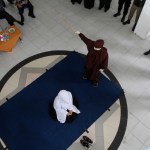










 Become an Insider
Become an Insider
Comments - Please login in order to comment.